Dealing With Sexual Harassment In The Workplace Training Course in China
Our corporate training course is also available in Shanghai, Beijing, Chongqing, Tianjin, Guangzhou, Shenzhen, Wuhan, Chengdu, Dongguan, Hong Kong, Nanjing, Shenyang, Hangzhou, Xi’an, Harbin, Suzhou, Qingdao, Dalian, Zhengzhou, Shantou, Jinan, Kunming, Changchun, Foshan, Ürümqi, Changsha, Hefei, Taiyuan, Shijiazhuang, Guiyang, Guilin, Lhasa, Lijiang, Yangshuo, and Zhangjiajie.
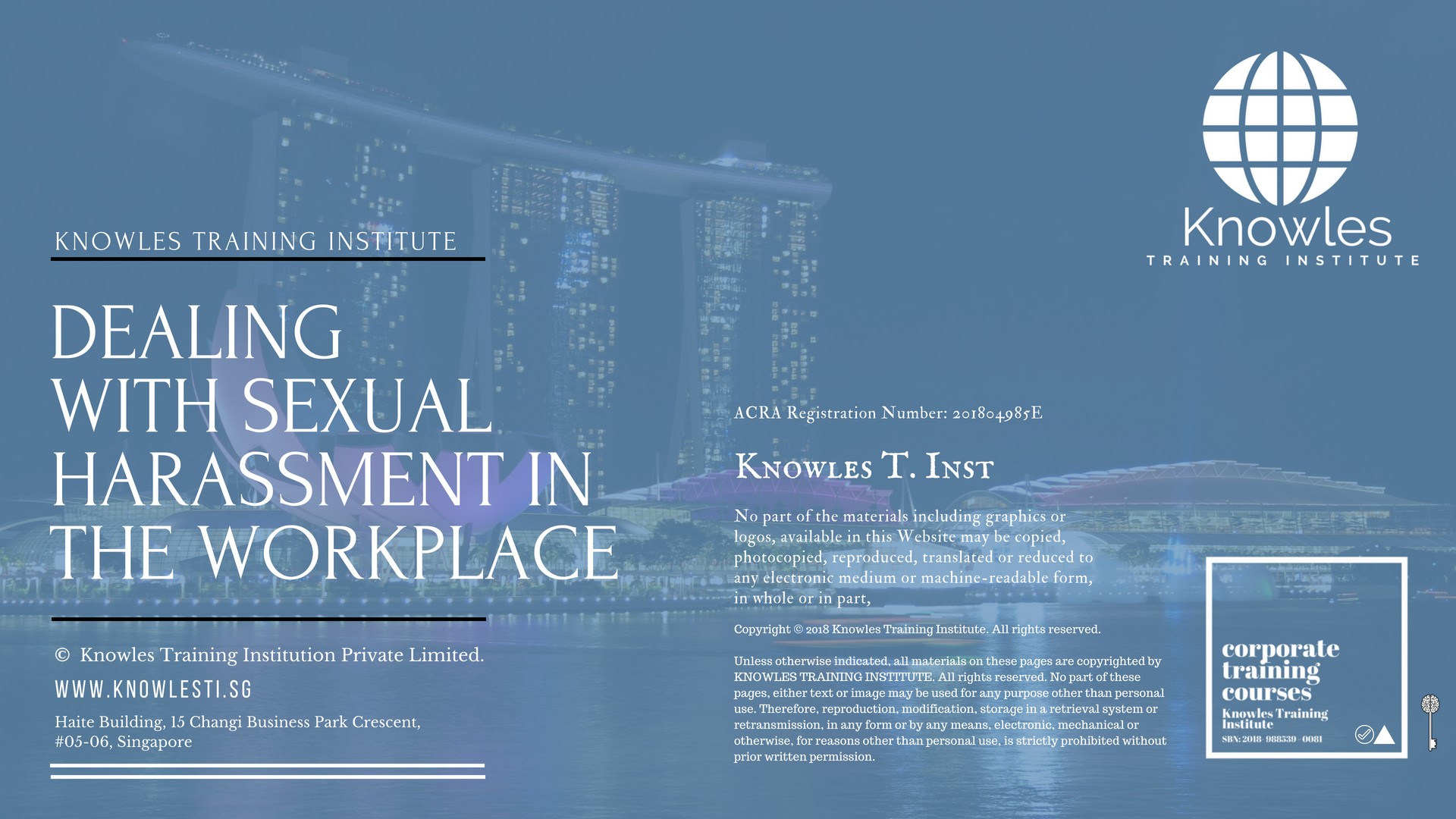
About This Dealing With Sexual Harassment In The Workplace Training Course in China
Dealing With Sexual Harassment In The Workplace Course in China
The first part of the course comprises of the theory section for this sexual harassment course. Participants will then brainstorm the various types of sexual harassment they encounter within their organisation. Since each organisation is different, this is a crucial component of this course. Participants will then create their own SOP for reporting sexual harassment with the given templates. This course ends with participants putting the SOP and templates in use through scenarios they discussed during the brainstorming session.
Sexual harassment is bullying or intimidation of a sexual quality and the undesirable or inappropriate hope of rewards in exchange for sexual favours. Sexual harassment involves a variety of actions from mild transgressions to sexual abuse or assault.
Sexual harassment can happen in several different social and professional environments such as the workplace, at home, school, universities, churches and many other places. Sexual harassers and their victims may be of either gender.
In most current legal contexts, sexual harassment is illegal. Laws encompassing sexual harassment usually do not prohibit simple teasing, offhand remarks, or minor isolated incidents—that is because they do not impose a “general civility code”. However, this is changing, and this sexual harassment workshop covers that.
In the workplace, harassment may be deemed illegal when it is persistent or severe thereby creating an unfriendly or offensive work environment or when it occurs in an adverse employment decision (such as the victim being fired, demoted or ends up quitting). The legal and social opinion of sexual harassment, however, varies by culture and countries.
Sexual harassment by an employer is a class of illegal employment discrimination. For many companies or organisations, preventing sexual harassment and defending employees from sexual harassment charges have become key goals of legal decision-making.
Who Should Attend This Dealing With Sexual Harassment In The Workplace Course in China Workshop
This Dealing With Sexual Harassment In The Workplace Course in China workshop is ideal for anyone who would like to gain a strong grasp and improve their Dealing With Sexual Harassment In The Workplace.
All Staff Within An Organisation
Managers
Team Leaders
Executives
Assistants
Officers
Secretaries
Group Size For This Dealing With Sexual Harassment In The Workplace Training Program in China
The ideal group size for this Dealing With Sexual Harassment In The Workplace course in China is:
Minimum: 5 Participants
Maximum: 15 Participants
Course Duration For This Dealing With Sexual Harassment In The Workplace Skills Course in China
The duration of this Dealing With Sexual Harassment In The Workplace Course in China workshop is 2 full days. Knowles Training Institute China will also be able to contextualised this workshop according to different durations; 3 full days, 1 day, half day, 90 minutes and 60 minutes.
2 Full Days
9 a.m to 5 p.m
Dealing With Sexual Harassment In The Workplace Course in China Benefits
Below is the list of course benefits of our Dealing With Sexual Harassment In The Workplace course in China
- Learn what sexual harassment is
- Understand why sexual harassment should never be tolerated
- Learn to make people aware of their options
- Achieve the removal of stigma when it comes to reporting sexual harassment
- Obtain skills that can help you support victims of sexual harassment
Dealing With Sexual Harassment In The Workplace Course in China Objectives
Below is the list of course objectives of our Dealing With Sexual Harassment In The Workplace course in China
- Develop a plan to ensure nobody is sexually harassed in the workplace
- Develop a form of counselling for anyone who is victim to workplace sexual harassment
- Monitor the co-worker relationships occurring in the workplace
- Provide courses that teach people what constitutes as sexual harassment
- Develop a keen understanding of morale justice among office workers
- Establish a no-tolerance policy for sexual harassment in the workplace
Course Content For This Dealing With Sexual Harassment In The Workplace Training Course in China
Below is the list of course content of our Dealing With Sexual Harassment In The Workplace training course in China
Sexual Harassment Training Course in China: Part 1: Introduction (2 Hours)
- Pre-Course: Take The Sexual Harassment Quiz
- What Is Sexual Harassment
- The Difference Between Sexual Harassment And Sexual Discrimination
- Sexual Harassment Effects Both Genders
- The 3 Forms Of Sexual Harassment
- Prevention For Against Sexual Harassment
- Important Information To Take Note Off From The Protection From Harassment Act (Poha)
- The Importance Of Bystander Intervention
- The Effect Of Sexual Harassment
Sexual Harassment Training Course in China: Part 2: Brainstorm (4 Hours)
- The Types Of Sexual Harassment That Occurs in The Workplace
- The Types Of Sexual Harassment That Occurs Off The Workplace
- Grading The Offence: Disciplinary Actions For Offenders
- Promotional Campaign For Prevention
- Promotional Campaign For Bystander Intervention
- The Reporting Process
Sexual Harassment Training Course in China: Part 3: Create (3 Hours)
- Write Your Own SOP For The Reporting Process
- Use The Template Create The Reporting Process From Sexual Harassment In The Workplace
- Use The Template Create The Reporting Process From Sexual Harassment Off The Workplace
Sexual Harassment Training Course in China: Part 4: Testing The Sop And Template Through Scenarios (3 Hours)
- Sexual Harassment In The Workplace
- Sexual Harassment Off The Workplace
- Make Changes If Necessary
Sexual Harassment Training Course in China: Part 5: Conclusion (1 Hour)
- Post-Course: Take The Sexual Harassment Quiz
- Take The Pledge!
Dealing With Sexual Harassment In The Workplace Course in China Value Added Materials
Each participant will receive the following materials for the Dealing With Sexual Harassment In The Workplace course in China
Dealing With Sexual Harassment In The Workplace Course in China Learner’s Guide
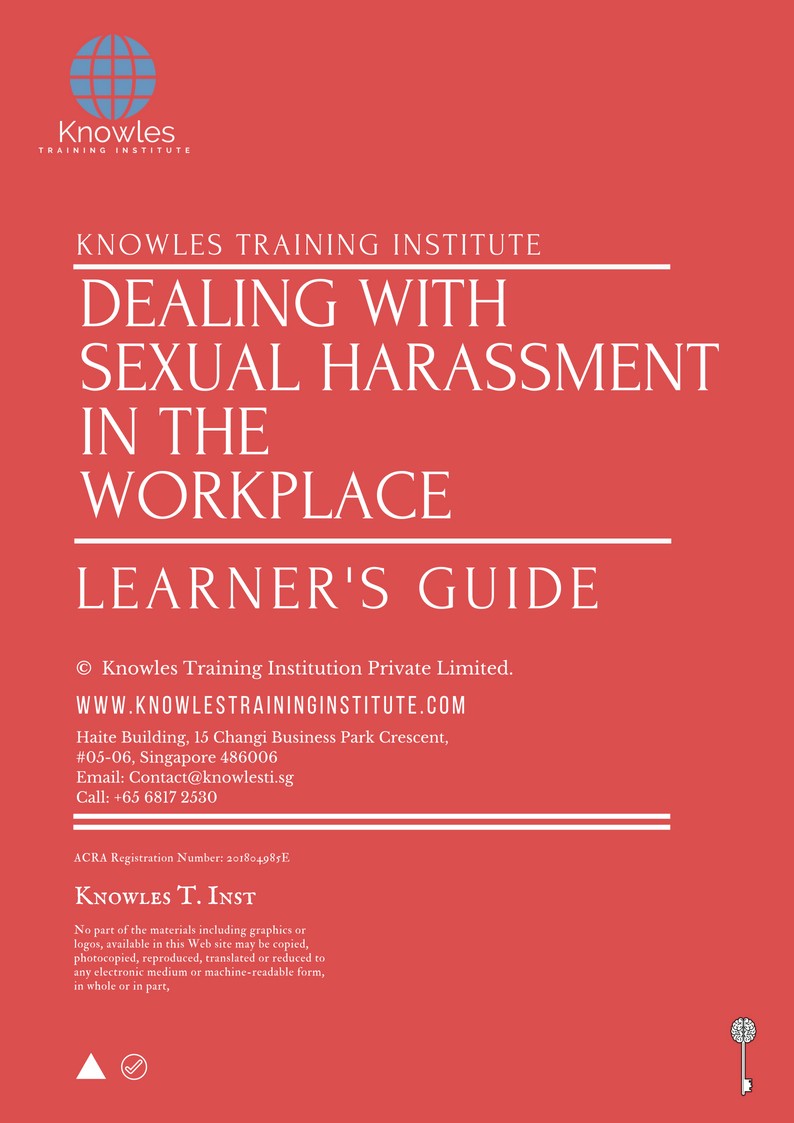
Dealing With Sexual Harassment In The Workplace Course in China Handouts
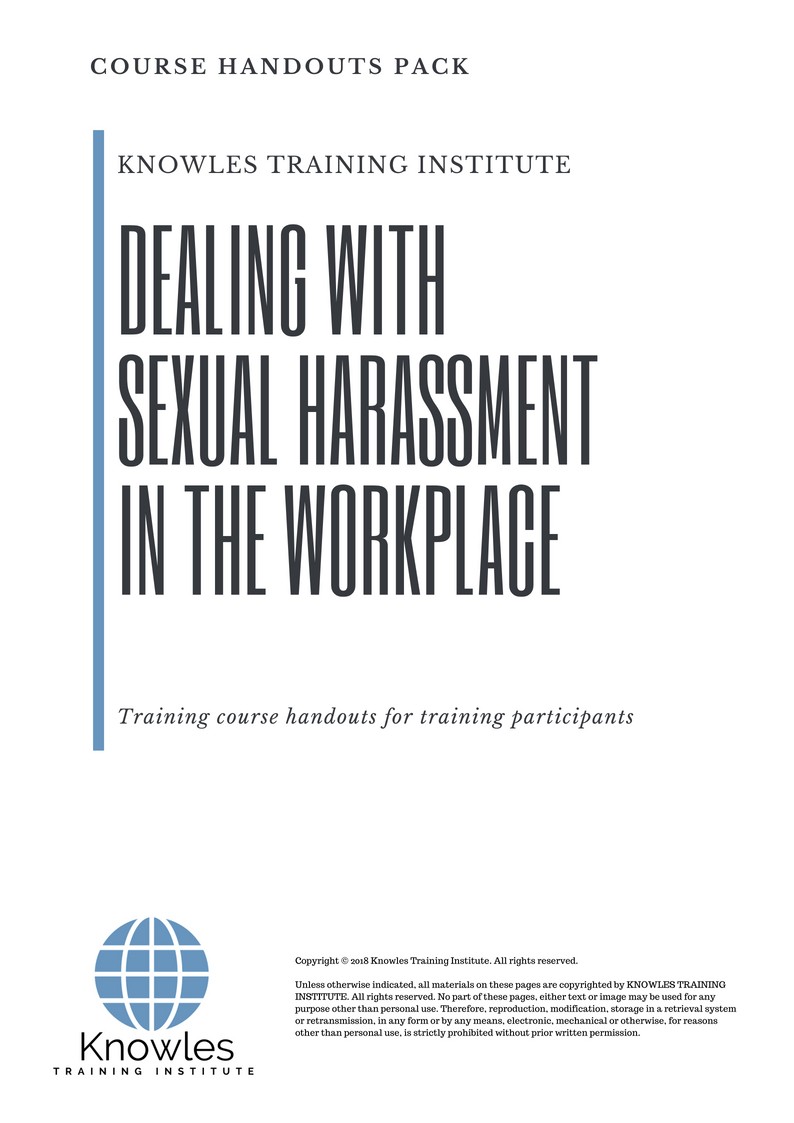
Dealing With Sexual Harassment In The Workplace Course in China PPT Slides Used During Course
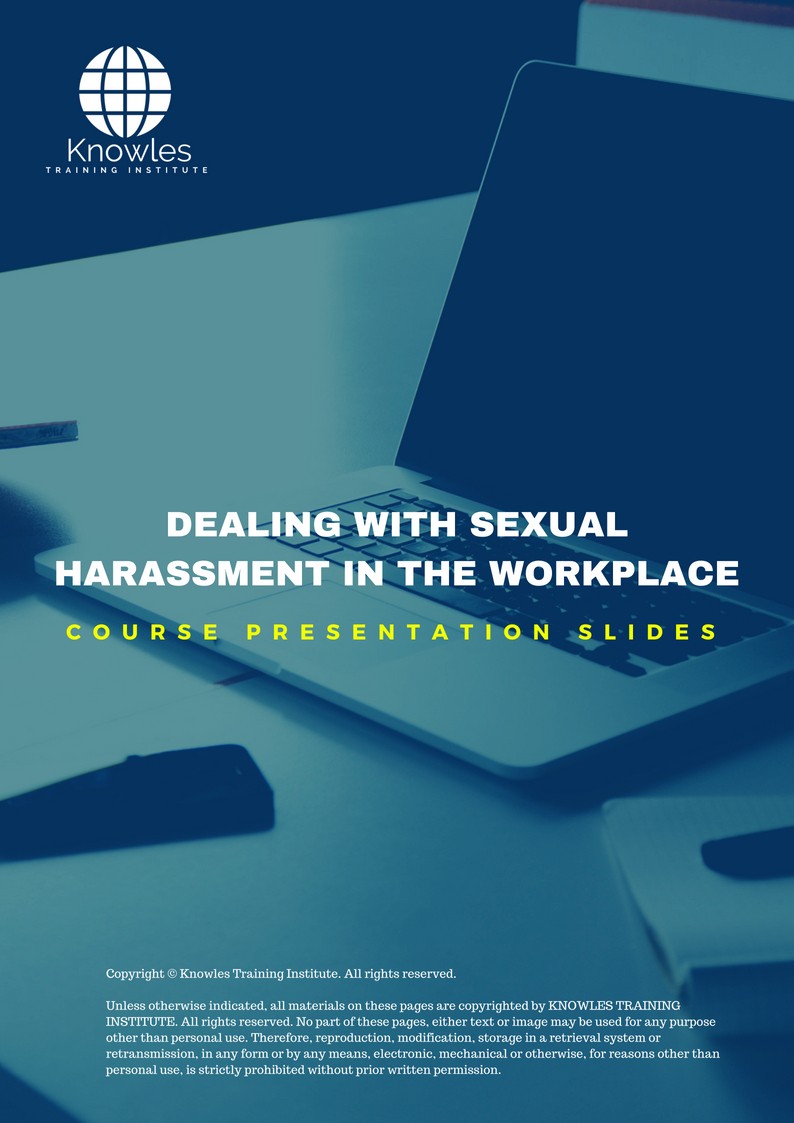
Dealing With Sexual Harassment In The Workplace Course in China Certification
Each course participant will receive a certification of training completion
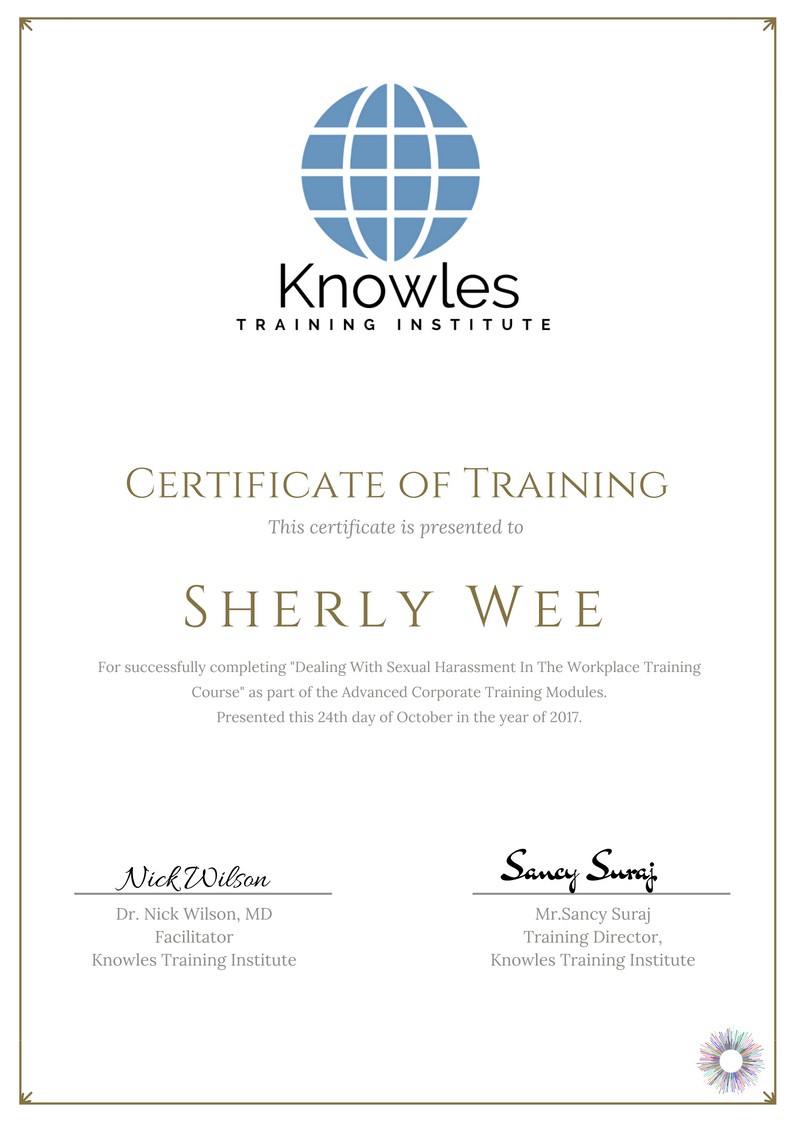
Course Fees for Dealing With Sexual Harassment In The Workplace Course in China
There are 4 pricing options available for this Dealing With Sexual Harassment In The Workplace training course in China. Course participants not in China may choose to sign up for our online Dealing With Sexual Harassment In The Workplace training course in China.
USD 1019.96 For a 60-minute Lunch Talk Session.
USD 434.96 For a Half Day Course Per Participant.
USD 659.96 For a 1 Day Course Per Participant.
USD 884.96 For a 2 Day Course Per Participant.
Discounts available for more than 2 participants.
Upcoming Dealing With Sexual Harassment In The Workplace Training Course in China Schedule
Contact us for the latest Dealing With Sexual Harassment In The Workplace course in China schedules:
Email: contact@knowlesti.cn
Message:
Download Dealing With Sexual Harassment In The Workplace Course in China Brochure
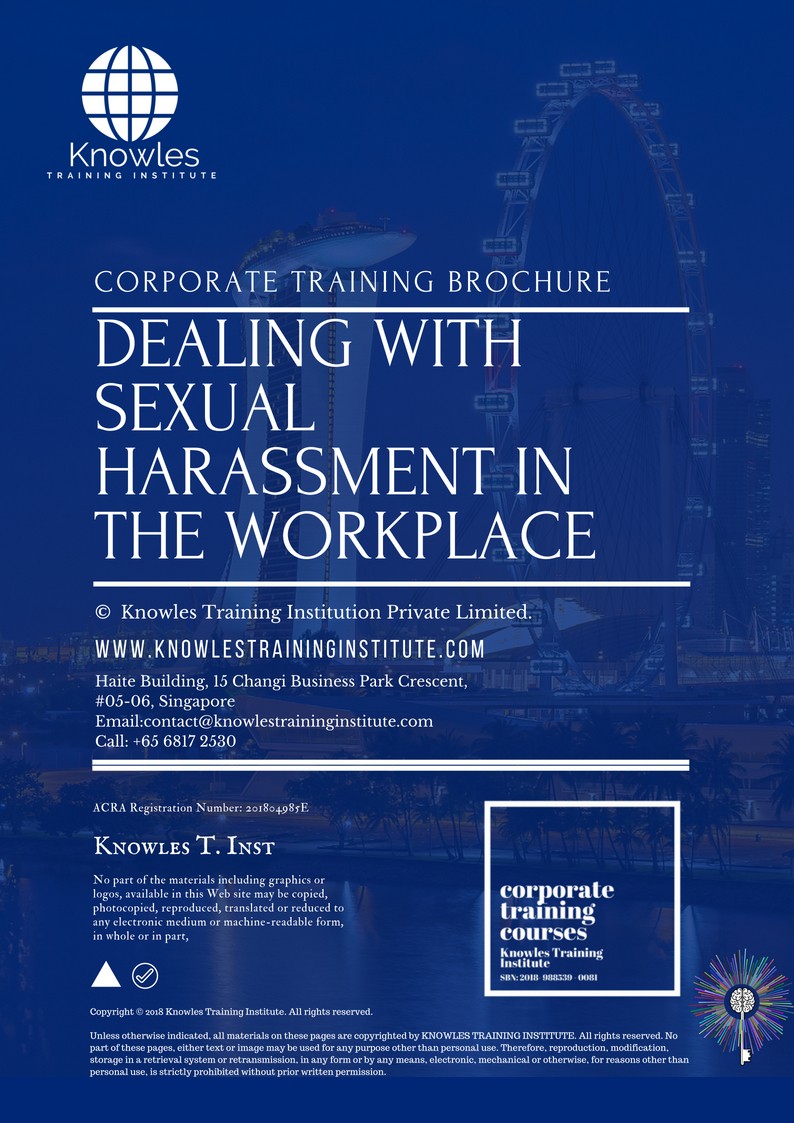
Request for this Dealing With Sexual Harassment In The Workplace course in China brochure. Fill up the short information below and we will send it to you right away!
Post Training Support: A vast majority of training does not have any effect beyond 120 days. To work, training has to have a strong pre- and post-training component. Post-training reinforcement helps individuals to recall the understanding and ask questions.
Blended Learning: Learning does not occur in the classroom. Virtually everybody prefers distinct ways of learning. Successful learning should have a multi-channel, multi-modal strategy.
- We Understand The Industry: We’ve got a profound comprehension of the business, business design, challenges, strategy and the that our participants are in and have designed the courseware to cater to their professional needs.
- Course Content: Knowles Training Institute’s material is relevant, of high quality and provide specific learning results. Participants will leave the training course feeling as they have gained a strong understanding and will also be in a position to execute what they have learned sensibly.
Course Development — The workshop modules follow a systematic and logical arrangement. This structure helps to ensure that the course material allows the facilitators to deliver the course in a logical arrangement. Consider the subjects as building bricks into learning, our facilitators slowly build towards a comprehensive picture of this entire topic.


Course Enquiries

Fill up the form and we will get back to you in less than 1 working day.
Alternatively, give us a call to have one of our training consultants contact you. Our corporate training courses can be contextualized to meet your organization’s training needs. Leverage on our large pool of professional trainers and consultants for your organization’s training needs.
Email: contact@knowlesti.cn
We Guarantee 100% Privacy. We Respect Your Privacy. Your Information Will Never Be Shared.
Questions
Sexual harassment is described as uninvited sexual approaches, requests for sexual services, and other verbal or bodily conduct of a sexual nature when either:
The behavior is made as a term or state of an individual’s employment, training, living environment.
- Physical Harassment.
- Personal Harassment.
- Discriminatory Harassment.
- Psychological Harassment.
- Cyberbullying.
- Sexual Harassment.
- Third Party Harassment.
Sexual harassment can cover someone: feeling, grabbing, or performing other physical contacts with you without your permission, making comments to you that have a sexual connotation or asking you for sex or sexual favors.
Sexual abuse, also introduced to as molestation, is offensive sexual behavior by one person against another. It is frequently perpetrated using power or by using use of another. When force is immediate, it is called sexual assault.
It can be the same kind of action or different types of behavior on each event. For instance, one text message meant to bother you is not harassment. Two text messages can be harassment. One text message and one call can also be harassment.
Behaviours that are not deemed as harassment are those that originate from a bond of mutual consent. A hug among friends, mutual coquetry, and a notice on physical appearance among colleagues are not deemed harassment.
Sexual harassment can transpire in the workplace or training environment, like a school. It can occur in many various situations, including after-hours discussions, exchanges in the corridors, and non-office environments of employees or peers.
Leering, which is a evasive, lustful look or sideways glimpse suggesting a sexual excitement or wicked intent, is an undesirable and persistent kind of staring that commissions harassment. Harassment also incorporates unwelcome, persistent sexual other types of gestures whose suggestive nature is clear.
Uninvited, unwanted physical communication. The delivery or display of any written, electronic or graphic material, including calendars and cartoons that are sexually provocative, or show malice to an individual or group because of sex.
The term victimization is used to define the unfair way of treatment of a worker by an employer because of some act the worker has received. If you are being victimized but not because you are declaring your rights under certain employment legislation, then the problem may be harassment or bullying in the workplace.
If you are the sufferer of harassment, you can take effect in court against the person harassing you. You need to make your case within a certain time of when the harassment happened. You can still take court action even if the person harassing you hasn’t been pronounced guilty of a criminal offence.
Types of victimization include, and are not limited to bullying or peer victimization, physical, sexual, verbal abuse, robbery, and assault. Example, bullying or peer victimization is most generally studied in children and teenagers but also takes place between adults.
Power harassment is harassment or uninvited attention of a political nature, often transpiring in the environment of a workplace. Power harassment can be considered a form of illegal prejudice and is a form of political and mental abuse, and bullying.
Having power over a person can influence how comfortable they feel, saying no to sex, someone may fear contradictory consequences for not complying. When someone misuses power over a partner, they may use spoken threats or not. Either way, consent is never welcome when someone feels they don’t have any other choice.
Harassment includes a broad range of behaviors of an aggressive nature. It is generally understood as behavior that demeans, embarrasses or humiliates a person, and its unlikelihood characteristically identifies it in terms of social and moral reasonableness.
Sexual harassment is described as uninvited sexual approaches, requests for sexual services, and other verbal or bodily conduct of a sexual nature when either:
The behavior is made as a term or state of an individual’s employment, training, living environment.
You can speak with your own boss, the supervisor of the person who is attacking you, or any supervisor in the company. Describe what has happened and ask for that person’s advice in getting the behavior to stop. The law guards you from retaliation (punishment) for complaining about harassment.
One legal demand for sexual harassment is that the conduct is “uninvited.” Make sure the harasser understands that his or her conduct is uninvited. Let the person know that their behavior hurts you. Firmly refuse all offers for dates or other particular inaction outside of work.
In order to pass as sexual harassment the behavior must be deliberate and/or repeated. Some forms of sexual behavior are so terrible that the first time they occur they are recognized deliberate, inappropriate, and sometimes even illegal actions.

